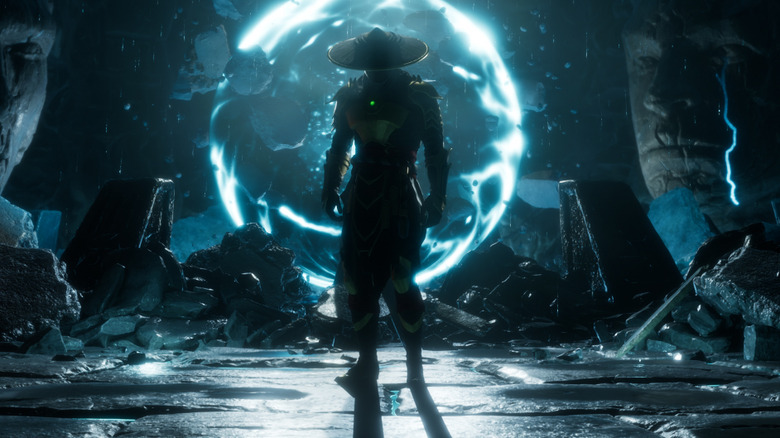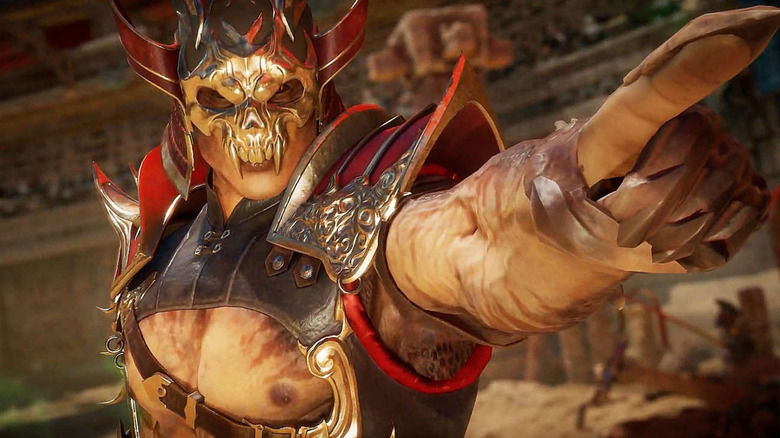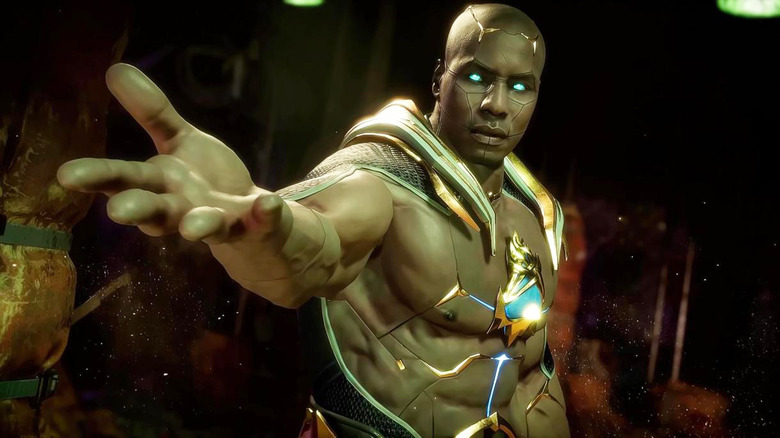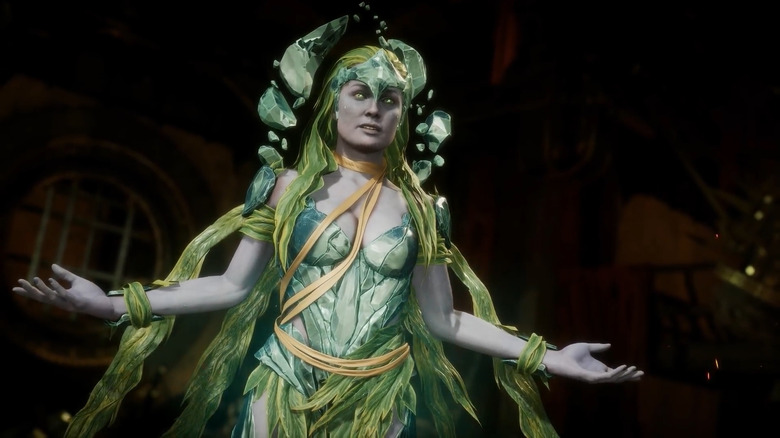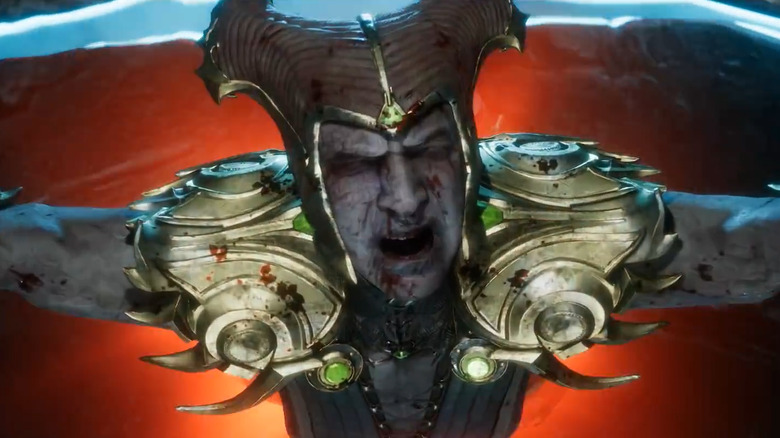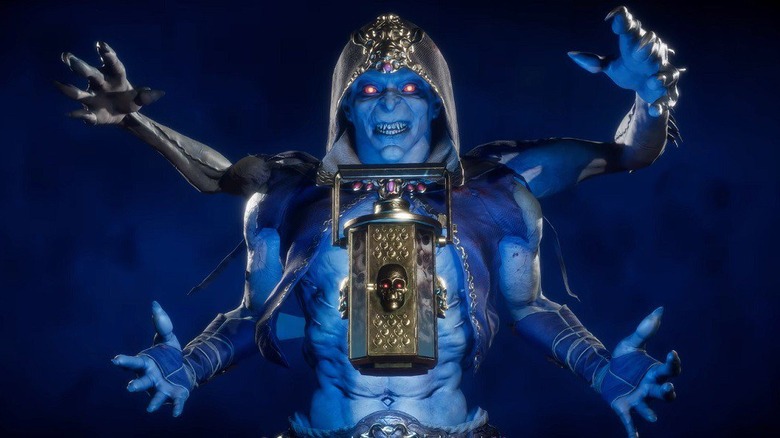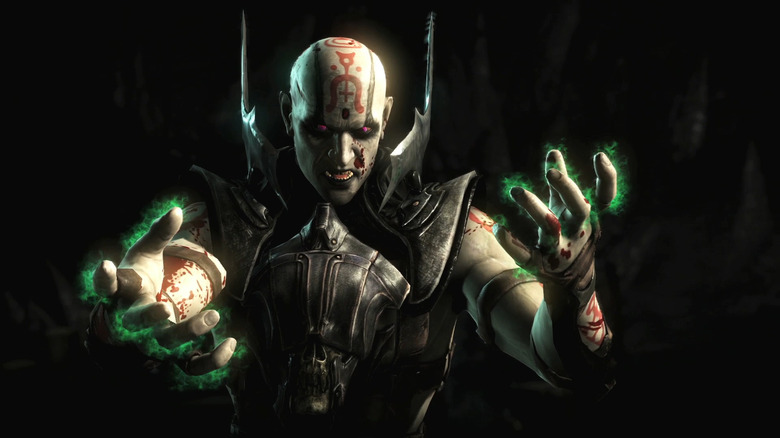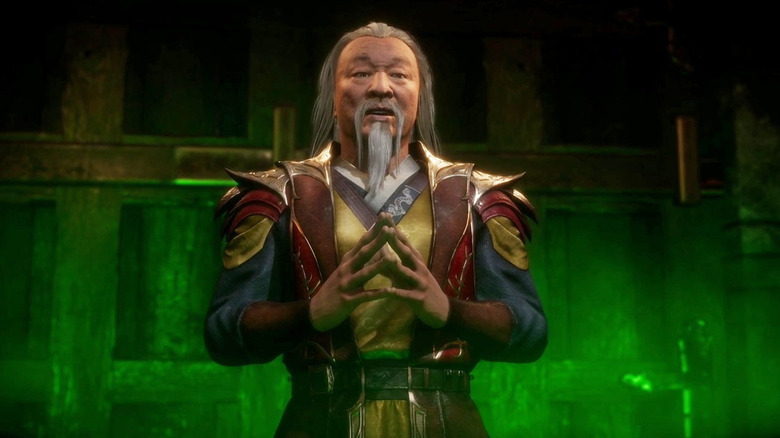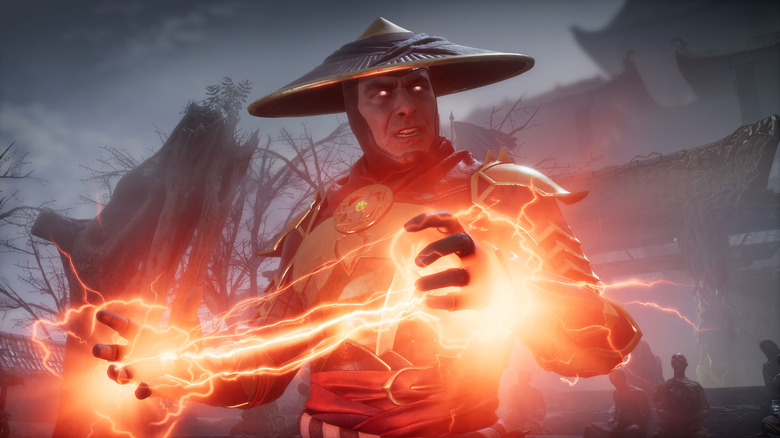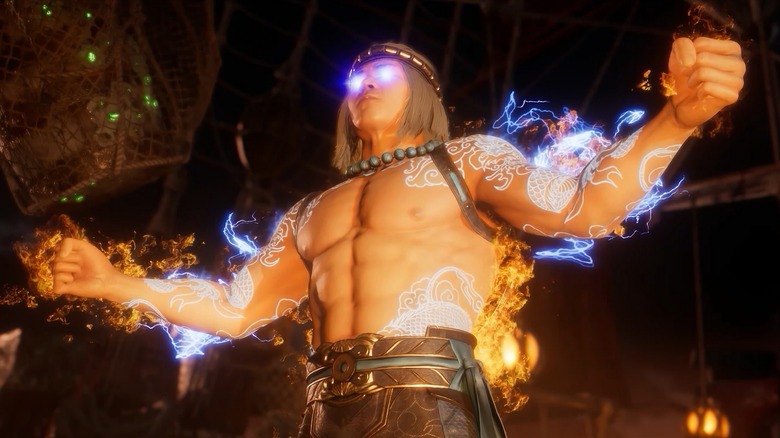Characters Who Mean More In Mortal Kombat 11 Than You Realized
Ever since the original Mortal Kombat bicycle-kicked its way onto the arcade scene in the autumn of 1992, fans have clamored for more details behind the strange and esoteric lore of the setting's fabled Outworld and its bloodsoaked tournament of champions. And with the advent of the critically acclaimed series reboot in 2011 — which dusted off and reimagined a wide swath of MK's classic and most intriguing characters on top of introducing new ones — there's been a renewed interest in the deep roster of this hallowed franchise.
Critical reception of MK11 has been predominantly positive since the game's launch, with outlets like The Guardian claiming that it's "comfortably the best Mortal Kombat in a long time," even going so far as to say "the single-player experience is the most accomplished of any recent fighter." With that notion on one hand and a fond reflection of our days of Kombat past on the other, we wanted to analyze the who's who of MK11 in an attempt to chart the latest twists and turns in the complex mythology of this titanic series. Join us, then, as we take a closer look at the characters who mean more in Mortal Kombat 11 than you actually realized.
Shao Kahn was down but not out
According to the official Mortal Kombat 11 roster, this "deterred but determined" Emperor of Outworld has dominated the realms for millenia, expanding his empire through the subjugation of his enemies. Nevertheless, "when he set out to claim Earthrealm, he was blocked by the rules of Mortal Kombat." Shao Kahn's role (and subsequent fate) as the final boss of Mortal Kombat 9 was quite clear, but what about his involvement in the events of MK11?
Shao Kahn's appearance in Mortal Kombat 11 as a pre-order DLC character might seem like little more than fan service, but the prodigal return of Mortal Kombat 2's big bad has issued some loud echoes throughout MK11's action-packed narrative. A feud with his former protege Jade, his ongoing conflict with the usurper Kotal Kahn, the unwavering loyalties of the blood mage Skarlet ... these details and more shine a light on Shao Kahn's furtive involvement with MK11's overarching storyline — and hint at a possible return to glory for the displaced emperor.
And as Shao Kahn's crony the Kollector elucidates, the intervention of the Elder Gods is what originally precipitated Shao Kahn's fall from grace (and Kotal's eventual rise to power as Kahn of Outworld). Kronika herself explains that Shao Kahn is under her protection, since she enlists "all those who disdain the current course of history." So, despite his previous defeat, it seems the old emperor is a crucial part of MK11's time-splitting story after all.
Geras is built to spill (your guts)
Mortal Kombat 11 introduces a few strange new faces to the franchise's motley lineup of characters, and the mysterious automaton known as Geras is one to keep an eye on. The MK11 roster describes him as "an artificial construct, built by Kronika" who "faithfully serves her goal of restarting time and rewriting history." After the release of his reveal trailer, Geras garnered some hype from fans who appreciated a new character in the roster, especially one that "totally breaks the rules of conventional fighting game characters with some of his moves."
He's a new character, sure; but until they get their hands dirty, players might not understand the full extent to which Geras has an effect on the events of Mortal Kombat 11. Most notably, Geras is tasked by his creator Kronika with collecting Jinsei, capturing Shang Tsung's harvested souls, and battling several members of Raiden's alliance in an effort to rewrite the timestream. As we come to find out, Geras isn't just Kronika's right-hand man; he's a crucial (if not the most important) key to her crazy plan to reboot history.
Cetrion makes the ultimate sacrifice
Cetrion isn't just a pretty new face with prodigious elemental power, she's the Elder Goddess of Virtue. As such, she's also the daughter of the game's big bad Kronika and sister to the betrayer Shinnok (who we see briefly fulfill his destiny at the beginning of Mortal Kombat 11). As the story goes, "At times, the heroic virtues she upholds are at odds with her quest for universal balance." The seeds of Cetrion's place in her mother's plans are sewn relatively early, but we finally see her step up to fulfill her destiny during Chapter 12, "End of an Era."
Not only does she help steer our heroes towards the fateful advent of Kronika's New Era, Cetrion ends up sacrificing herself to empower Kronika for Mortal Kombat 11's awesome endgame battle featuring Fire God Liu Kang. As Liu Kang preemptively points out, the Elder Goddess of Virtue fights for her mother's vision. And according to Cetrion herself, "The greatest virtue is abiding [her] mother's will."
Shinnok's story ain't over yet
The inexplicable Elder God of Death and Darkness known as Shinnok made his original appearance in the offbeat platformer Mortal Kombat Mythologies: Sub-Zero back in 1997, and became a playable character for the first time in Mortal Kombat 4 that same year. Shinnok is ruler of the Mortal Kombat underworld known as Netherrealm, and has been an interesting source of lore since he first hit the scene. This culminated with a cameo in Mortal Kombat 9 and an appearance in Mortal Kombat 10 as both an unlockable character and the game's main boss. But the climax of MK10 saw Shinnok squarely out of commission — so what does he really have to do with Mortal Kombat 11?
Shinnok returns for MK11, but his stay is seemingly brief. He appears during the game's prologue alongside the corrupted Raiden, who — after torturing the Elder God — rips his head clean off his shoulders. He's also referenced in his sister Cetrion's origin story, where Shinnok is confirmed to be the offspring of MK11's big bad, Kronika. When she arrives to find Shinnok's still-living severed head, Kronika slows time and is quick to assure her dreadful son that "this is not [his] destiny" and that "the arc of the universe bends to [her] will."
So, not only does his pedigree as a primary Mortal Kombat antagonist directly affect this latest narrative, we can very likely expect Shinnok to return as a playable character or future antagonist somewhere down the line.
The Kollector has his hands full of hidden lore
The Kollector might look cool, but there's a lot more to this new character than meets the eye. This loyal servant of Shao Kahn makes his debut in Mortal Kombat 11, and offers players a handful of revelations about MK lore, notably explaining that the merc gunslinger Erron Black killed his brother, why D'Vorah betrayed Kotal Kahn to Shinnok, and how Mileena usurped the Outworld throne. But it goes deeper: who is this strange multi-limbed marauder and where precisely did he come from?
An official press release describes the Kollector "as more of a corrupt mafia enforcer than a government official" who "stole riches from Outworld's people, rewarding himself with wealth and status in turn." But this is Mortal Kombat, people; no room for happy endings. "When Shao Kahn died, Kotal Kahn vowed to weed out the former regime's corruption." Part of that vow includes the elimination of Shao Kahn loyalists like the Kollector, one of the key players in the emperor's march to reclaim the Outworld throne.
In Episode 7 of the Kombat Kast, developers revealed that the Kollector is a member of a six-armed race of beings known as Naknada, and while he's brand new to the audience, he's actually older in terms of lore. "A long part of Shao Kahn's regime," the Kollector served as a glorified taxman, collecting tribute from all corners of the empire. His presence in MK11 offers players keen insight into the ramifications of the Kotal Kahn era of Outworld.
Quan Chi is gone but not forgotten
When Mortal Kombat 11 begins, Quan Chi — necromancer of Netherrealm and servant of the Elder God Shinnok — is dead. He lost his head towards the end of Mortal Kombat X, when the ninja Scorpion (aka Hanzo Hasashi) decapitated Quan Chi in an ill-fated attempt to stop him from summoning Shinnok. Spoiler alert: Quan Chi completed the ritual, freeing Shinnok for the MKX endgame and ultimately setting the stage for the madcap events of Mortal Kombat 11.
Despite being unplayable at launch, Quan Chi somehow maintains his status throughout Mortal Kombat 11 as one of the franchise's most sinister characters. No matter how you cut it, Quan Chi's efforts to revive Shinnok in MK10 are directly responsible for the inciting events of Mortal Kombat 11. Not to mention, the ninja Noob Saibot (very much a playable character in MK11) plays a curious role as a furtive survivor of Quan Chi's dark necromantic legacy ...
Shang Tsung is keeping the Krypt
The main antagonist of the original Mortal Kombat returns for MK11, and was the first playable DLC character to be announced for the game. But while Shang Tsung's presence in the game might seem like a gimme, the fact that Warner Bros. and NetherRealm Studios hired actor Cary-Hiroyuki Tagawa to reprise his role from the 1995 Mortal Kombat movie serves to hint that there might be more lore in store for our favorite wily old shapeshifter. In the meantime, throughout the events of MK11's storyline we come to understand that Shang Tsung's Well of Souls is a crucial component to Kronika's timecrafting agenda — which justifies the evil sorcerer's continued presence and then some.
In addition to the voice and likeness of fan favorite Tagawa, this latest installment in the franchise sees Shang Tsung preside over the the Krypt, Mortal Kombat 11's third-person game mode. The Krypt offers players challenges and unlockable items within the time-honored sandbox of Shang Tsung's island, which Polygon describes as "a nostalgic trip for Mortal Kombat fans," a "miniature Metroidvania" that serves as "a reminder of how fresh the series can feel." And who better to take us back to those halcyon days of arcade bloodsport than the evil sorcerer who started it all?
Raiden is Earthrealm's ultimate wingman
Mortal Kombat's immortal God of Thunder has perpetually been a key player throughout the series, and he unsurprisingly takes the front seat during the events of Mortal Kombat 11. After all, his killing of Shinnok is the catalyst for Kronika's direct involvement. However, even Raiden's long-standing legacy and appearance in the game's opening cinematic don't quite prepare us for his prolific involvement in the Keeper of Time's nefarious plot to shred the quantum fabric of reality. Along with Liu Kang, Raiden is one of the central figures in the Mortal Kombat 11's elaborate time-bending narrative.
Raiden, a cornerstone of the MK franchise mythology, is even more important to the plot of Mortal Kombat 11 than we realized because he melds with revenant Lui Kang during the game's "best ending" to create the new and improved Fire God Liu Kang — the only entity capable of shutting down Kronika and saving the Realms. As Fire God Liu Kang tells his companions during "End of an Era," Raiden actually becomes part of Liu Kang, bound to his soul. "He made [him] a god. For now, at least." Raiden's gift shields Liu Kang from the power of Kronika's Hourglass, the Fire God kicks Kronika's ass, and the rest is history.
As story completionists can attest, Raiden's victory against Shinnok during the prologue only scratches the surface of his involvement with the MK11 endgame and the hinted-at mythologies of Mortal Kombat's mysterious Titans.
Liu Kang is the man with the plan (to stop Kronika)
According to legend, the Shaolin monk and Champion of Earthrealm known as Liu Kang "was an orphan adopted and trained in the arts of kombat by the Shaolin order," who he honored by "defeating Shang Tsung in Mortal Kombat and saving Earthrealm as 'the Chosen One,' a title that weighs heavy on his shoulders."
Along with Scorpion and Sub-Zero, Liu Kang has traditionally been one of the poster children for the Mortal Kombat franchise, but his role in Mortal Kombat 11 means a lot more than it initially seems to. Along with Raiden, Liu Kang is an essential part of the MK11 finale, and appears in all 3 of the game's varied endings. The "good" and "best" endings even feature our head-banded hero taking up godlike powers from Raiden to beat the game's big bad final boss (a move that possibly hints at greater things to come in Mortal Kombat 12 ... eventually).
Kronika, "displeased with how history has unfolded," has targeted Liu Kang, Raiden, and their allies for assimilation into the New Era. Fortunately for Earthrealm, Fire God Liu Kang absorbs his Revenant counterpart's knowledge of Kronika's headquarters (The Keep) as well as an understanding of her master plan. "I know where to find the Hourglass," he says during the final chapter, assuring his companions that they can beat Kronika. And they do. They beat her good. All thanks to a likely hero's unlikely ascent to godhood.

